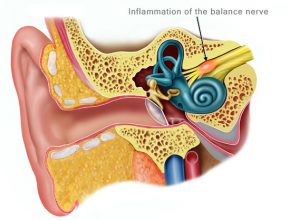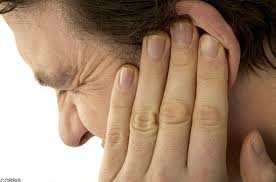Vestibular Neuritis
What is vestibular neuritis?
Vestibular neuritis, also known as vestibular neuronitis, is a condition of the inner ear that causes a sudden onset of vertigo, nausea and vomiting. Vertigo is the sensation that one’s environment is spinning around them when it isn’t. These symptoms can range from severe forms that require bed rest or mild forms in which individuals can carry on with their daily lives. It generally results due to infection of one ear but can affect both ears.

If you are suffering from the above symptoms it is important that you see your doctor.
Who is affected by vestibular neuritis?

Forty to fifty year olds are the most commonly affected by the condition, however children can also be affected. Males and females are equally likely to have vestibular neuritis. Prior to developing the condition many people have an upper respiratory tract infection, e.g. the common cold.
What’s the prognosis?
Generally the condition will last for one to two weeks. The symptoms will begin suddenly, become more severe and then quickly subside. In some individuals the symptoms will disappear completely after approximately two weeks, however others will enter the chronic phase. The chronic phase may last from a year to several years. During the chronic phase individuals may experience episodes of vertigo and nausea, but these will become less frequent and less severe with time. Some people will only experience a general unsteadiness during the chronic phase.
Does vestibular neuritis cause hearing loss?
There is no hearing loss or tinnitus associated with the condition. If the vertigo is accompanied by hearing loss or tinnitus it may be due to other conditions like labrynthitis or Meniere’s disease.
What causes vestibular neuritis?
Inflammation of the vestibular nerve is thought to cause the condition. This inflammation is usually due to a viral infection, although it may also be due to a bacterial infection.
The ear is divided into three major components: the outer ear, middle ear and inner ear. The inner ear is responsible for converting sound waves into electrical impulses that travel in the auditory nerve to the brain. The inner ear also houses the vestibular system, which is one of three sensory systems that keep us oriented in our environment and helps us stay balanced (the visual system and the proprioceptive system also help us maintain balance).
The vestibular system contains the following structures: the semicircular canals, the utricle the saccule and the vestibular nerve. The semicircular canals are filled with fluid. When our head moves the fluid within the semicircular canals also moves and this information is sent to the brain where it helps us perceive when our bodies are rotating and how they are rotating. The utricle and saccule help us sense when are bodies are accelerating.
In vestibular neuritis, the vestibular nerve that carries information about balance from the inner ear to the brain is inflamed. This affects the transmission of messages to the brain and results in vertigo, nausea and vomiting.
Viruses that cause the condition may be localised to the inner ear (only affect the inner ear) or they may be systemic (affect the whole body). Some viruses that can cause the condition include herpes viruses, measles, rubella, influenza, mumps, polio, hepatitis and Epstein-Barr.
How is it diagnosed?
A medical history is collected along with detailed information about the symptoms being experienced. Questions could include when the vertigo began, whether it is persistent or fluctuating, whether it is triggered in certain circumstances, was it preceded by a cold or othe
r infection and whether tinnitus or hearing loss are also being experienced.

Your doctor will rule out other causes of vertigo by conducting a physical examination in which the head and neck are examined along with the ears. Other tests may need to be carried out to rule out other causes, e.g. a hearing assessment, medical imaging tests, blood tests and other assessments.
How is vestibular neuritis treated?
This will depend on the cause and the severity, e.g. if it is caused by a viral infection antiviral drugs instead of antibiotics will be given. Medications and vestibular rehabilitation therapy are two forms of treatment commonly used. Some individuals may not require treatment as the symptoms will disappear quickly. However, it is important to visit your doctor if you are concerned about vestibular neuritis because your doctor will help you determine the best course of action.
What medications are available to treat vestibular neuritis?
Medications aim to either manage the symptoms or treat the infection. Medications to control vertigo and nausea are often used. These may include benadryl, antivert, phenergen, ativan and valium. Medications to treat the infection may include antiviral drugs or antibiotics.
Medications are generally used during the acute phase of the condition. Once a person enters the chronic phase the use of drugs is often avoided to encourage the body to adapt and to prevent unnecessary reliance on drugs.
What is vestibular rehabilitation therapy and who is it suitable for?
Vestibular rehabilitation therapy is suitable for those in the chronic phase of vestibular neuritis. It is an exercise program that is guided by a specialist physiotherapist, occupational therapist or audiologist. It aims to teach a person’s balance system to adapt to the changes within the vestibular system and subsequently improve vertigo and nausea. Regular home exercise is a requirement of the therapy and these exercises will be tailored to the individual’s needs. Taking medication to manage vertigo interferes with the body’s ability to adapt and therefore interferes with the efficacy of this treatment. It can take a week to months for adaptation to occur.
